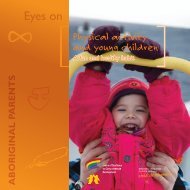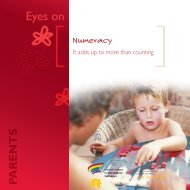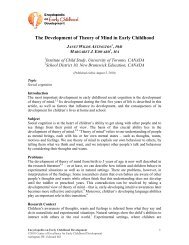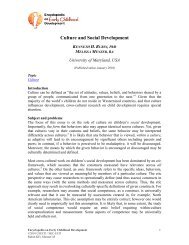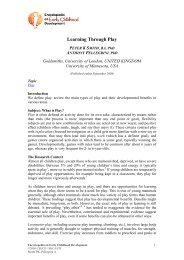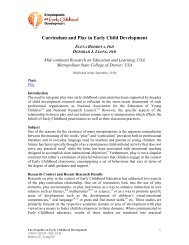Eyes on Social cognition: Helping your child understand people's ...
Eyes on Social cognition: Helping your child understand people's ...
Eyes on Social cognition: Helping your child understand people's ...
Create successful ePaper yourself
Turn your PDF publications into a flip-book with our unique Google optimized e-Paper software.
<strong>Social</strong> cogniti<strong>on</strong><br />
“Children who<br />
develop social<br />
cogniti<strong>on</strong> at a<br />
young age have<br />
the foundati<strong>on</strong>s<br />
for good social<br />
interacti<strong>on</strong>s before<br />
they start school.”<br />
© 2011 – Centre of Excellence for Early Childhood Development<br />
What do we know?<br />
■ “<strong>Social</strong> cogniti<strong>on</strong>” means being able to <strong>understand</strong> our own and others’ thoughts, desires, intenti<strong>on</strong>s,<br />
and feelings.<br />
■ Children begin to develop social skills when they <strong>understand</strong> how people’s thoughts, desires,<br />
intenti<strong>on</strong>s, and feelings affect the way they act and behave.<br />
■ Infants are born with an innate preference for social interacti<strong>on</strong>s. From birth, they pay the most<br />
attenti<strong>on</strong> to human faces and voices.<br />
■ In the first m<strong>on</strong>ths of life, infants are able to smile at people, and resp<strong>on</strong>d to others with gestures<br />
and facial expressi<strong>on</strong>s.<br />
■ By the end of the first year, infants start to share interest and attenti<strong>on</strong> in objects with you, and may<br />
decide whether or not to try a new activity based <strong>on</strong> <strong>your</strong> expressi<strong>on</strong>. For example, <strong>your</strong> infant may<br />
not play with a new toy if you appear anxious or worried.<br />
■ Around the age of two, toddlers distinguish a real object from a pretend object (ex. using a block as a<br />
teleph<strong>on</strong>e).<br />
■ As they grow older, <strong>child</strong>ren become able to talk about what they and other people like, want,<br />
think or know (around age 3). They also <strong>understand</strong> that people express different emoti<strong>on</strong>s<br />
depending <strong>on</strong> the situati<strong>on</strong> (ex. knowing that an individual is happy when he gets what he wants<br />
or sad if he does not).<br />
■ Four-year-old <strong>child</strong>ren usually recognize that other people’s thoughts may differ from their own.<br />
They no l<strong>on</strong>ger believe that every<strong>on</strong>e knows what they know. This step in their development helps<br />
them to <strong>understand</strong> that their own thoughts do not always reflect reality.<br />
■ Children who are able to c<strong>on</strong>trol impulsive thoughts and behaviours are better able to develop social<br />
cogniti<strong>on</strong>.<br />
■ Children who develop social cogniti<strong>on</strong> at a young age have the foundati<strong>on</strong>s for good social<br />
interacti<strong>on</strong>s before they start school.<br />
■ School-aged <strong>child</strong>ren with a well developed social cogniti<strong>on</strong> have a tendency to be better at resolving<br />
c<strong>on</strong>flicts with friends, which in turn can lead to more positive relati<strong>on</strong>ships with their peers. But<br />
equally these <strong>child</strong>ren may be better at decepti<strong>on</strong> and manipulati<strong>on</strong>.<br />
■ <strong>Social</strong> and cognitive <strong>understand</strong>ing can have a positive impact <strong>on</strong> <strong>child</strong>ren’s later school success.



